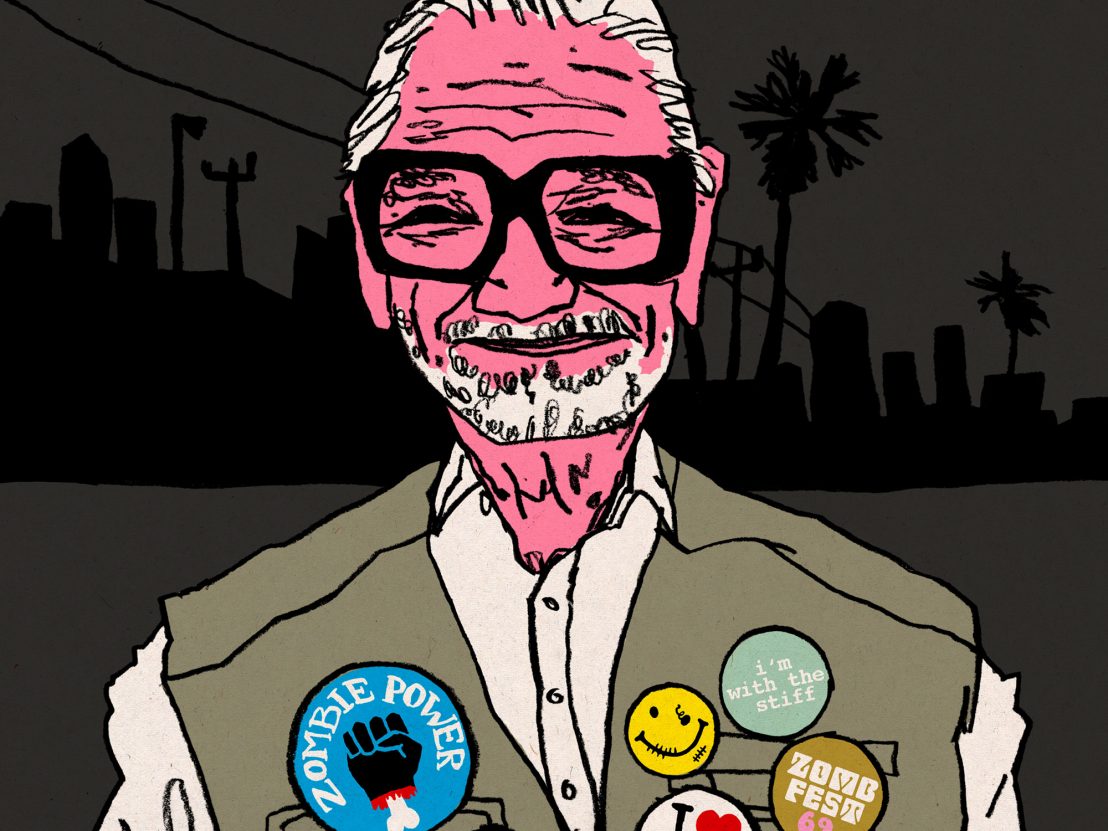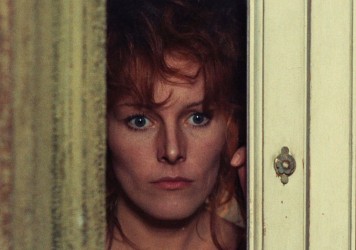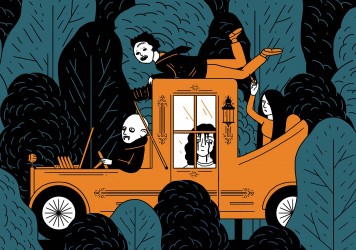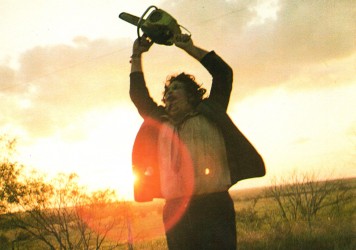
The horror maestro reflects on his unique and remarkable career in this previously unpublished interview.
George A Romero has passed away at the age of 77 following a brief battle with lung cancer. Although he will forever be synonymous with the zombie genre, reaching groundbreaking heights with 1968’s Night of the Living Dead – from which five more would follow – his brilliant filmography was by no means confined to the walking dead. Back in 2013, we sat down with Romero in London after a screening of his magnificent debut feature. What follows is a previously unpublished interview with one of horror cinema’s true masters.
LWLies: Night of the Living Dead has just been archived by the American Film Institute and the Museum of Modern Art. Are you still surprised by its longevity and its lasting impact?
Romero: God, I really am. I mean, it’s amazing to be honoured like that, but it’s been 45 years now… Lord!
There’s been so much writing about the subtext of the Dead movies. How does that feed into the writing process, is it something you start with or does it feed in later?
Yeah, well, ever since Dawn of the Dead. The first one I never thought would go anywhere. Certainly when we were making it, no one could have envisioned what would happen to the life of that film. I didn’t really have any rules, I was just thinking of it as one film. Then when people started to write about it as though it were important, I got intimidated. Everybody was after me to make another one. I said, ‘I don’t want to just make another one, I have to have an idea, I have to have something to say!’ So that was it, and it took me 10 years to come up with that idea.
I knew the people socially who were developing this big shopping mall, and it was the first one in western Pennsylvania, the first one that any of us had ever seen. I went out to visit it before it opened and saw the trucks coming in, bringing everything that you could ever possibly want in your life into this enormous building. So the concept was there, it just seemed like this temple to consumerism. The light went off and I thought maybe I could do something with this, so I started to write the script. That was the moment I realised I could use zombies, couching whatever it was I wanted to do or say within the context of a horror film, that it would give me the chance for a little social criticism.
So you weren’t thinking along those lines when you wrote the ending for Night?
Well, the question of race was the furthest thing from my mind. When I was writing that character, I was thinking about the disintegration of family, the whole idea that people can’t cooperate, even when faced with a disastrous situation they just stick to their own agendas, arguing about whether to go upstairs or downstairs instead of facing the problem. When John Russo and I wrote the screenplay, he was a white guy, we didn’t change the script. So when Dwayne [Jones] agreed to play the role, we all had a conversation and decided that it was a bold move to not change the script. That was it. The same things happened to him when he was white, the redneck posse came and shot him, because they thought he was a zombie, not because they knew he was black. It was an accident really, in the end a happy accident. The night we drove the first print to New York we heard on the radio that King had been assassinated, so of course the film immediately took on a completely different slant.
We were big fans of Survival of the Dead.
I’m so glad to hear that! I mean, that film just went completely unnoticed in the States. We watched The Big Country a bunch ahead of shooting. We were really going for that look, even if we didn’t really have the money. We shot it at 2:35:1 and wanted those big MGM/UA colours.
You’ve spoken previously about your ideas for a zombie noir…
Well, I’m trying to avoid zombies now. All of a sudden the whole world is zombified. I could never sell a zombie movie now unless I promised to spend $250m and filled it with the most amazing CG effects. That’s all they’re buying right now.
So the likes of World War Z isn’t helping you get your projects made?
You just can’t get a small movie off the ground. No one wants to risk $10 or $15 million, people will only risk two or three, which forces you into a certain category. If you’re judicious enough, and are able to squeeze it into a short enough schedule, you can still make a pretty good film at around three million. That film looks around five or six. That’s the benefit of having great techies, I’ve got a wonderful DP and design staff.
Do you miss the smaller scale of filmmaking from your Pittsburgh days?
Yeah, I’m in Toronto now. I moved after Land of the Dead, my people left! The production centre just left. There was one big $400 million year, with Silence of the Lambs and Innocent Blood, so if you were working as a technician in the industry you could have a career and still live there. Then Hollywood discovered St Louis and moved on, the jobs dried up. I was used to working with this small cadre of friends and family, and I had to find that again in Toronto when I made Bruiser, that same work-ethic and willingness to make sacrifices. We used to be non-union and just freewheeling, in the days when I shot Martin, for example. We could work at our own pace with no regulations. I always put it down to how many shots I can make on a given day, and I just love a producer who will allow you to do that. I think we spent way too much on Land of the Dead. I didn’t think we needed the cast, I didn’t think we needed Dennis Hopper’s expensive cigars, the biggest line-item in the budget.
From what we’ve read, it seems like you didn’t enjoy that production much.
I didn’t, no. I just didn’t enjoy the process, it was just way too big. Once you have the stars and all the other stuff that comes with that – their own make-up people, the certain caterer and certain type of food they have to have – everything just mushrooms. It gets crazy, it gets way out of hand. I like the film, but it was just hard to keep a lasso on it. If you lose just a little bit of control, they keep taking little pieces out of your hands. Like, ‘We’ll just shoot this bit second-unit, you keep working.’ I don’t want a second-unit, I want to shoot it myself! And it’s only because of the excesses in other areas that that needs to happen. We could have easily bought another five days shooting if we’d been a little more judicious, if they’d eaten a little less lobster.
There was a big gap between Day and Land…
Well, I wanted to do one for the ’90s. I’d written a version of Land, but I just couldn’t sell it. I hard a hard time selling it for a long time, because Day of the Dead hadn’t done that well. That’s what happens to me, I try to make each one different, then people just don’t show up! Suddenly, 10 years later they’re flying off the shelves at the video store. They just don’t want it to be different, they just want me to remake Dawn of the Dead every time.
https://www.instagram.com/p/BWpfRUEA-lT/
Speaking of different ones, Monkey Shines is just terrific. It’s shot like a Hitchcock movie.
It was a novel first, that one. I was approached by a producer in New York – Bob Evans’ brother, Charles – to adapt and shoot it.
Was directing the monkey a nightmare?
I loved it, I could sit and do that all day. It came down to faking around. We had all sorts of props, and my partner Peter ended up doing a lot of second unit because there was no way I could hang around getting monkey footage all day. I did a bunch of it, but then I had to leave Peter with a sort of shopping list. Peter had a bag full of maracas and Mexican hats, all he had to do was step in and try to get a reaction out of the monkey.
You made a great Edgar Allan Poe film with Dario Argento, what made you choose Mr Valdemar for your episode?
I didn’t choose that one initially. I wanted to do Masque of the Red Death, but it turned out Larry Gordon was already doing it. I went back to my Poe and thought it’d make for something pretty creepy, and Dario seemed to like the idea.
Dario Argento famously re-cut and re-scored Dawn of the Dead, how did that come about?
That was his deal from the beginning. He said I could do whatever I wanted for the English-language release, that he wouldn’t interfere at all, but that he’d like to recut it for European audiences. I knew he was going to use Goblin, but he said I didn’t have to. He wound up cutting a lot of the humour and stuck with Goblin all the way. I never looked at it carefully enough, but I’m pretty sure he did. But that’s the difference between his and my personality. I think that cut plays on the same level the whole way, it doesn’t hit any of the subtleties, the little horror subtleties – which I wouldn’t have minded except part of my version was spoofing classical horror stuff, and I don’t think he hit any of those notes at all. I used some pretty corny library tracks, but somehow it works.
Speaking of people messing with your work, you’ve not been able to avoid the remake frenzy…
I asked Stephen King once how he felt about people destroying his books, and we was like, ‘They’re not destroying them, they’re still on the shelf.’ I kinda feel that way about it. They did a remake of The Crazies and made it into a sort-of-zombie film. I dunno, I didn’t enjoy it…
Hopefully Martin will be left well alone.
I don’t know if there are any plans for that, and Knightriders I just don’t know if anyone would. The only one that I would like to remake is a very early one. My title was Jack’s Wife, which was released as Season of the Witch…
That’s a great one! It’s very feminist.
I thought so. I also thought, who am I to write a feminist movie? It was a bit obvious in that way. I think I’d be more able and bit more sensitive now, I’d make her more powerful in life, she was just too weak until she came to believe that witchcraft was making her strong enough. I think there’s a story there that I wouldn’t mind trying to do again. Knightriders I don’t think you could do now, how would you have? Vin Diesel?
Knightriders is another of your films concerned with questions of tribalism, of mismatched people coming together in the face of adversity. Where does that recurring interest come from?
I dunno, probably the movie business. It’s the way I see things, I guess. Tribalism is at the root of the world’s problems. It’s just my view of it. Religion and tribalism of any kind cause… bombings.
Have you ever been seduced by the lure of Hollywood?
My partner and I spent four or five years where we let ourselves be seduced. We made some deals and ended up writing a dozen scripts, probably. I made more money than I ever had in my entire career. Writing, re-writing, developing a version of one thing or another for Nicole Kidman. Then she says no, so it’s, ‘Let’s do one for Meryl Streep!’ We just kept re-writing, in typical development hell. We actually had a deal at Universal to do The Mummy, it was green-lit. But MGM wouldn’t let us out of a deal with only 12 days left to go. So MGM and Universal got into a pissing contest over it and neither happened. I just got so sick of that shit. That’s what brought me to Toronto, because I’d written this little film called Bruiser. We got the money from Canal+ and in Toronto that $5 million turned into six.
So money is best found overseas now?
I just don’t have the patience, nor probably the span of years, to sit around in development. You look for the path of least resistance. It’s the only way it becomes realistic. So right now, for example, I know I can’t sell a zombie film to anybody, so I’m doing a comic book. I took that path. Hopefully it can become a film, but at the moment I’m doing 15 books for Marvel.
How are you finding that process?
It’s great, and I don’t have to shoot it! The writing process is exactly the same, and the visual process only slightly different. The artist isn’t limited by budget restraints, so it’s terrific.
How do you judge artistic success to yourself? Is it about a pleasurable production process, or how it’s received publicly, critically?
Not critically, no. The production process is very important. Martin is my favourite film of mine, and the main reason is because of the experience I had shooting it. It was wonderful. We were non-union so we had no constraints. We were there to just do the work and make the film. I just have the fondest memories of that. I also happen to think, partly because of that, that it just let me be able to do whatever it was I wanted to do. I was able to make any and every shot that I wanted to make in that film, whereas usually you end up compromising, cutting things off the production board. Same with Day of the Dead. Shooting that film was one the best times I’ve ever had. Whereas with The Dark Half, I had a DP who thought he was going to win an Oscar, and just gave me grief every minute. He quit indignantly about six times, and I thought I was gonna get canned because of my problems with Tim Hutton. I was ready to just throw my hands up, it was really hard to keep a rope on that one. But that’s what happens.
How do you feel about the auteur label?
I take pride in it. That’s the reason I’d never want to go do a Masters of Horror episode if I couldn’t write it, or go direct and episode of The Walking Dead. I mean, I wouldn’t wanna do that anyway. I really just wanna do my own stuff, and writing is the first line of defence. You can’t defend something forcibly if you didn’t write it.
The above illustration was originally published in LWLies 03: the Land of the Dead issue.
Published 17 Jul 2017

Iconic stars like Anita Strindberg and Edwige Fenech are the thread that ties this deviant subgenre together.

Join us on an epic round the world trip to some of the darkest reaches of horror cinema.

It may not be the most iconic piece of film music, but Tobe Hooper’s organic, visceral soundtrack is uniquely unsettling.